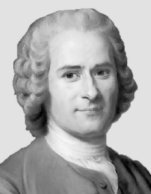|
性行为的发展
|
|
性行为的发展阶段 |
|
儿童期的性行为发展 |
 |
|
让-雅各·卢梭
(1712-1778),
瑞士日内瓦人,也作为作家和作曲家侨居于法国和英国。他提出了儿童的性“纯洁”的观点,并且要求青少年应该防止出现性好奇。
|
|
Jean-Jacques Rousseau
(1712-1778), a native of Geneva, also lived in France and England as a famous writer and composer. He supported the sexual “innocence“of children and demanded that adolescents should be protected from their own sexual curiosity. |
|
|
在阐述儿童期的性行为发展具体细节之前,回忆有关儿童的性行为发展的历史背景也许是有用的:在古代和中世纪,儿童被看作“小大人(miniature
adult)”,他们会尽力参与所有的日常活动。直到18、19世纪,欧洲和美国的中产阶级才开始发觉儿童期为一个带有其自身需要和规律的特殊而“天真的”生命时期。(他们也发觉),甚至随着时间的推移,青春期会转入一个特殊和(需要)“被保护的”时期。青春期成为介于儿童期与成年期之间的一个冗长的从属时期,在这个时期,(社会文化)会要求青少年要保持性节制。
“启蒙时代”最重要的作家家之一的让-雅各布·卢梭(Jean-Jacques
Rousseau)就写过一部有重大影响的著作。在这部著作《爱弥儿或论教育》(Emile or On Education,
1762)里,卢梭宣称儿童天生就是“圣洁无邪的”,为了他们自身的利益,必须要维持他们的性无知(sexual
ignorance)状态。青春期之后,性知识只有在回答直接的问题时才能给予解答,即使在那时,通过设法把这个议题弄得使青少年感到厌恶来阻塞他们的进一步好奇才是明智的。如果教育者压制性器官及其功能与最令人厌恶的勃起方面的联系,这也许是最好的教育方式。另一方面,青少年必须要小心翼翼,以避免唤起不成熟的任何过于明显的性冲动。青少年的“自然”清纯与成人社会的堕落影响隔离得越长久越好。
卢梭的教育思想对一代又一代的教育者发挥了巨大的影响,而且继而,这些教育者于19世纪把性压抑推向了登峰造极的程度。 |
|
Development of Sexual Behavior |
|
Stages of Development |
|
Childhood |
|
Before going into
concrete details about childhood sexual
|
development, it may be useful to recall their historical background: In ancient and medieval times, children were seen as “miniature adults” who participated in all daily activities as best they could. It was not until the 18th and 19th centuries, that the the European and American middle classes began to discover childhood as a special, “innocent” phase of life with its own needs and rules. Indeed, in the course of time, even adolescence turned into such a special, “protected” phase. It became an ever-lengthening period of dependency between childhood and adulthood in which young people were expected to remain sexually abstinent.
A seminal book in this respect was written by
Jean-Jacques Rousseau, one of the most important authors of the “age of enlightenment”. In “Emile or On Education” (1762), he declared that children were born in a state of "holy innocence", and that their sexual ignorance had to be preserved for their own good. After puberty, sexual information was to be given only in answer to direct questions, but even then it was advisable to stifle further curiosity by making the adolescent disgusted with the subject. Perhaps it was best if the educator stressed the connection of the sex organs and their functions with the most repulsive aspects of excretion. On the other hand, one had to be careful not to arouse any premature passions by becoming too explicit. A single inappropriate remark could ruin a pupil's life. For as long as possible, the “natural” innocence of youth needed to be protected from the corrupting influence of adult society.
Rousseau’s ideas exerted an enormous influence over generations of educators, and they, in turn, greatly
contributed to the sexually repressive climate of the 19th century. |